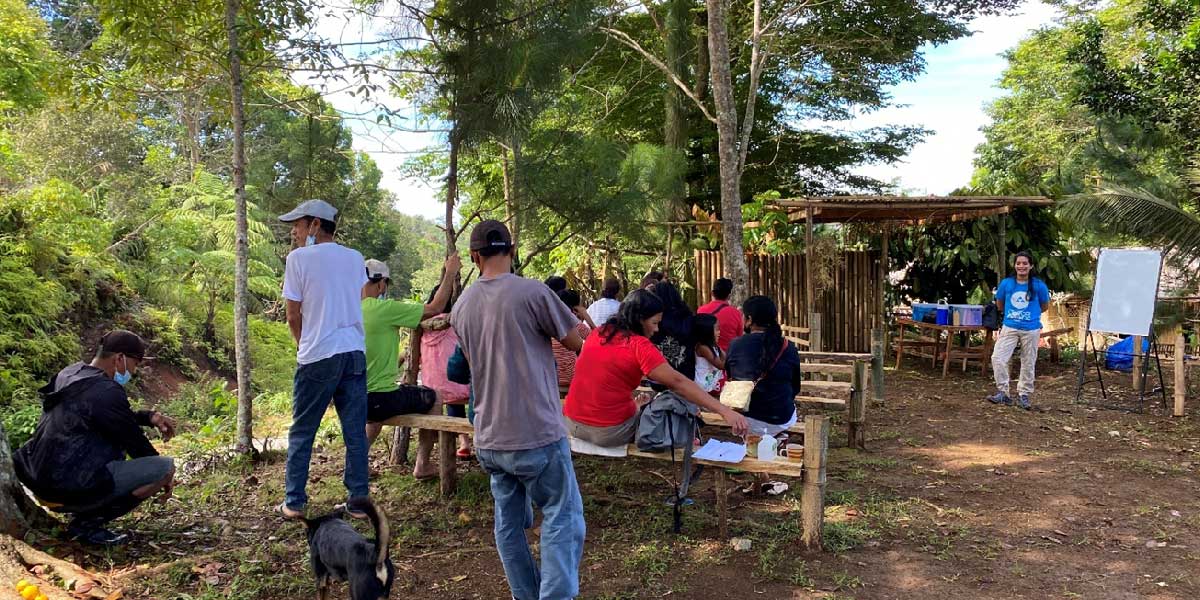
By Esther Abegale Cinco
ALTAVAS, Aklan – Coffee for Peace promotes justice and harmony through coffee produced by local farmers.
Coffee for Peace is a community of peacebuilders, business owners, and local farmers who are practicing inclusive development principles in the coffee industry with social entrepreneurship as a business approach in achieving peace.
Chief executive officer and founder of Coffee for Peace, Felicitas “Joji” Pantoja explained that the idea came to mind when she saw coffee being served during peace talks.
“[It was] the inspiration. The inspiration na came from that serving coffee,” she said.
MENTORING FARMERS
Pantoja and her husband founded Peace Builders Community, the partner of Coffee for Peace.
“That was our original work, the business side just came because of a need. You cannot talk about peace kung gutom si farmer,” Pantoja explained.
She added that Peace Builders Community focuses on peace building.
“Now the peace building that we are trying to share with the farmers is not just peace building because there is the absence of war. But peace building within ourselves, our creator, with our neighbor and with our environment. So that’s the peace that we wanted to promote,” Pantoja explained.
A six-month course with basic discussion about conflict management, peace negotiation, values formation on peace and many more are then taught to the farmers.
According to Pantoja, these values and traits will help the farmers in promoting that their products are of good quality.
“[Our goal is] to educate and propagate the knowledge of the Filipinos; that our coffee is good, that we should buy our own coffee. Whether it’s sold by Coffee for Peace or by individual farmers, let’s buy it. Let’s buy our local coffee. Buy local, support local coffee growers,” she noted.
PAR TEAM
Pantoja explained that twenty five percent of their profit goes back to training and helping communities; to their Peace and Reconciliation Program (PAR).
PAR teams are trained to be agents of peace and reconciliation in their respective communities.
“We have volunteers. They train for two years. So parang nagkakaroon sila ng internship with us. With allowances, free food, and free lodging,” Pantoja explained.
They’re composed of local volunteers from conflict-affected communities who are paired with international volunteers. They are jointly trained in Fact-Finding Missions, Relief & Medical Operations, Peace Education, Justice Advocacy, Inter-Faith Dialogue, Cross-Cultural Communications, Conflict Transformation, Media Relations, Trauma Healing, Personal Growth & Development.
“So now we partner with lawyers who could advise them. It’s not just magkape kayo para makabenta kayo. But really, it’s dealing with the lives of people and addressing their needs,” she said.
Pantoja noted that they collaborate with other NGOs, social workers, and the government because Coffee for Peace and peace builders cannot do it alone.
HOW IT CAME TO BE
“When we searched kung saan nanggagaling yung coffee, mostly sa mga robusta farmers natin. So, we went up to the mountains and we discovered na meron pala tayong arabica coffee,” Pantoja said.
“Ang tanong, bakit hindi nagpa-progress ang lives ng mga farmers kahit na mayroon tayong kape dito? Pangalawa, bakit hindi alam na may arabica coffee tayo? Bakit robusta lang?” she added.
“That’s the reason why hanggang ngayon mahirap pa rin sila. So, I asked myself what I can do for these farmers since I will be using coffee as a medium for our message of peace,” Pantoja explained.
Pantoja then started researching and learning the best ways and steps on producing coffee.
According to Pantoja, coffee was only sold for 50 cents per kilo back in 2008.
“Noong nagre-research ako, I was in Sagada. I went there to inspect and see, tapos ganoon din kababa. Ang message ko sa farmers at that time, what if we try other processes? Na if they are willing, we can share it with them and we will offer them differentiated income,’ Pantoja added.
In 2020, coffee was sold for five dollars, which according to Pantoja is a big leap for farmers.
For more than a decade of being in the business, Coffee for Peace has now 880 farmer families.
(The author is a Communication and Media Studies student of UP Visayas)



















